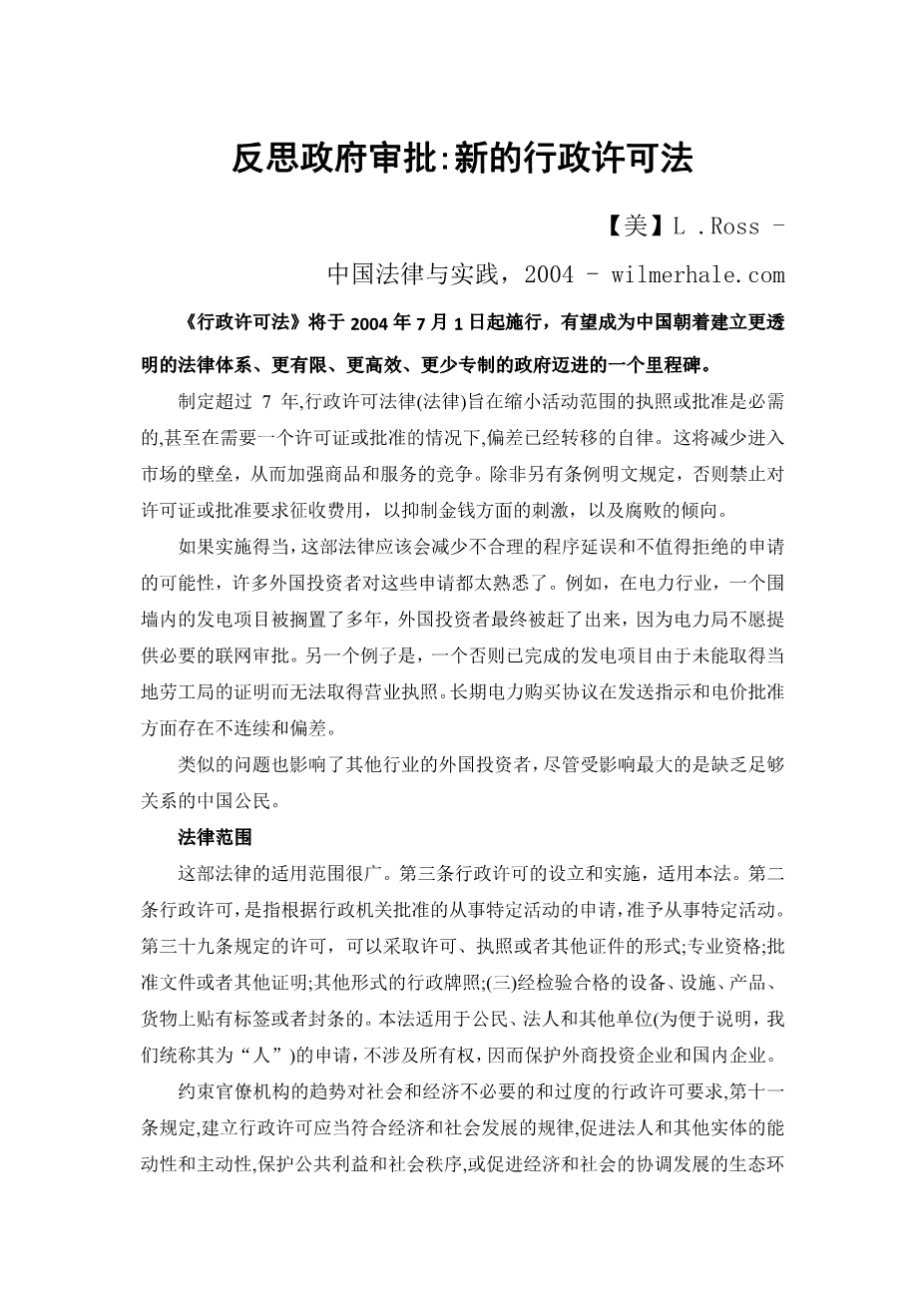Rethinking Government Approvals:
The New Administrative Licensing Law
【美】L .Ross –
China Law amp; Practice, 2004 - wilmerhale.com
The entry into effect of the Administrative Licensing Law on July 1 2004 promises to be a milestone in Chinarsquo;s advance toward creation of a more transparent legal system and a more limited, efficient and less arbitrary government.
More than seven years in the making, the Administrative Licensing Law (the Law) is intended to narrow the scope of activities for which a licence or approval is required, and even in cases where a licence or approval is required, the bias has been shifted in favour of self-regulation. This should reduce barriers to market entry and thereby enhance competition in goods and services. To curb the monetary incentive to impose licence or approval requirements, as well as the tendency toward corruption, the imposition of fees for licences or application documents is prohibited unless regulations expressly provide otherwise.
If well implemented, the Law should reduce the potential for the unreasonable procedural delays and non-meritorious rejection of applications with which many foreign investors are all too familiar. In the power industry, for example, an inside-the-fence generating project was held up for years, and foreign investors eventually driven out, by the unwillingness of the power bureau to provide an essential interconnection approval. In another instance, an otherwise completed generating project was unable to obtain an operating licence for failure to obtain certification by the local labour bureau. Long-term power purchase agreements have suffered from discontinuity and bias with respect to dispatch instructions and tariff approvals.
Comparable problems have affected foreign investors in other industries as well, although those most affected have been Chinese citizens lacking sufficient guanxi .
SCOPE OF THE LAW
The Lawrsquo;s scope is quite broad. Article 3 provides that the Law applies to the creation as well as the implementation of administrative licensing. Article 2 defines administrative licensing as the grant of permission for the undertaking of specified activities in accordance with an application to do so as approved by an administrative authority. Such permission, as stipulated in Article 39, may be in the form of permits, licences or other certificates; professional qualifications; approval documents or other certificates; administrative licences in other forms; and labels or seals affixed to equipment, facilities, products and goods that have passed inspection. The Law applies to applications by citizens, legal persons and other entities (whom we shall collectively refer to as “persons” for convenience of exposition) without regard to ownership, and thus protects foreign- invested as well as domestic enterprises.
To constrain the tendency of bureaucracies to subject society and the economy to unnecessary and excessive administrative licensing requirements, Article 11 provides that the creation of administrative licences shall be consistent with the laws of economic and social development, foster the activism and initiative of legal persons and other entities, protect the public interest and social order, or promote the coordinated development of the economy and society with the ecological environment. Administrative licence requirements that do not meet any of the above criteria are deemed improper.
Article 12 enumerates six areas where administrative licences may be required:
(1) state security, public safety, macroeconomic regulation, ecological environmental protection, and matters that directly impact human health or the safety of people or property;
(2) the development and exploitation of natural resources, the allocation of public resources, and market entry in industries that directly impact the public interest;
(3) determination of the qualifications for professions and industries that provide services to the public and directly impact the public interest;
(4) important equipment, facilities, products and goods that directly impact public safety, human health, or the safety of people and property, which must be examined in accordance with technical standards and norms;
(5) the establishment of enterprises or other organizations for which the qualifications of the principals must be determined; and other matters for which administrative licences may be required by law or administrative regulation.
The central government imposes administrative licensing requirements by law, administrative regulation or, when necessary, by decision of the State Council, although the latter must later be upgraded to the status of law or administrative regulation (Article 14). Article 15 provides that provincial-level governments may create administrative licensing requirements for matters not subject to national laws or administrative regulations. They may not do so, however, with respect to matters that should be subject to unified nationwide qualifications, or registration or preconditions with respect to the establishment of enterprises or other entities. Provincial-level administrative licensing requirements may not restrict competition by individuals, enterprises or commodities from other regions. No provision authorizes sub-provincial-level governments to impose administrative licensing requirements.
Conversely, administrative licences need not be imposed under Article 13 under the following circumstances:
(1) where persons are capable of making their own decisions;
(2) where market competition is capable of providing effective regulation;
(3) where industry or intermediary organizations are capable of self-regulation; or
(4) where the administrative authorities can resolve any problems by supervision after the fact or by other means.
The La
剩余内容已隐藏,支付完成后下载完整资料


英语译文共 4 页,剩余内容已隐藏,支付完成后下载完整资料
资料编号:[254079],资料为PDF文档或Word文档,PDF文档可免费转换为Word
以上是毕业论文外文翻译,课题毕业论文、任务书、文献综述、开题报告、程序设计、图纸设计等资料可联系客服协助查找。


